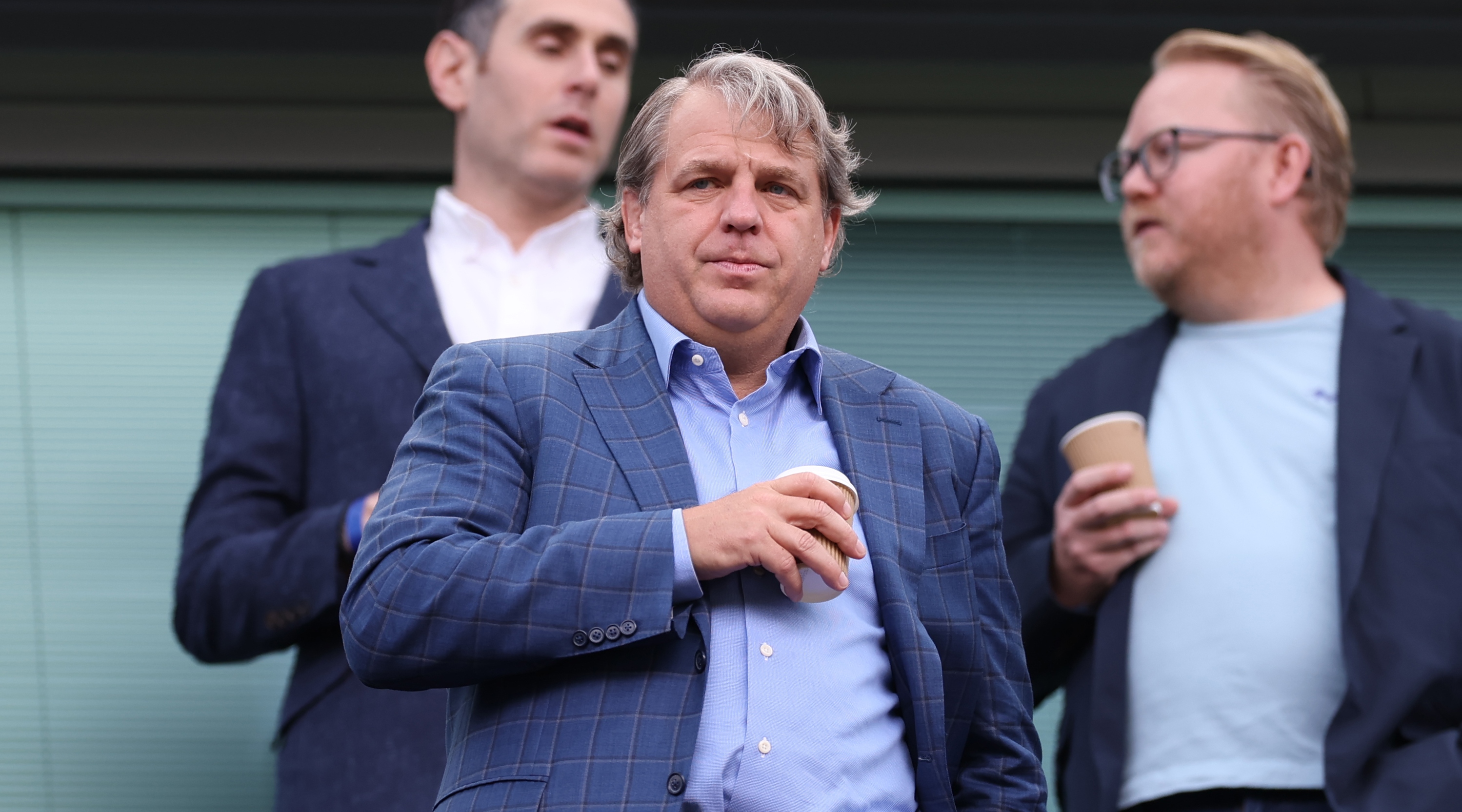Glazers, disgruntlement and grit: The inside story of FC United of Manchester's birth
The rebel club are on the march after reaching Conference North. Back in 2005, Andy Mitten found out how the club's founding fathers planned to stick it to a multi-millionaire...
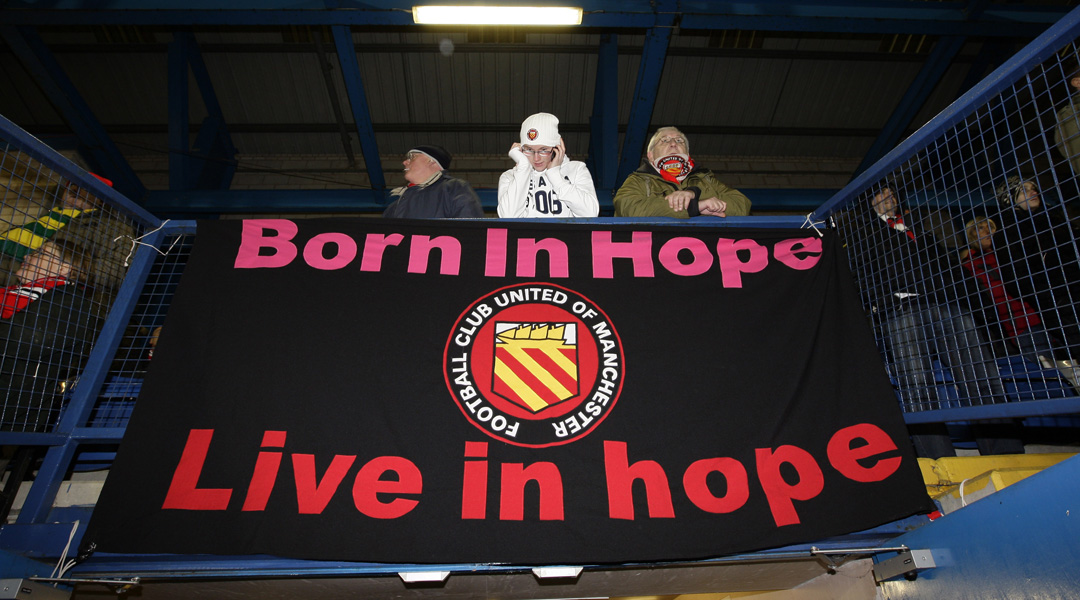
Karl Marginson wakes at 3.30am on the morning of June 22, an hour earlier than usual. Leaving his wife and children asleep in their west Manchester semi-detached, he drives past Old Trafford as he begins his day job as a white van driver delivering food to the elderly. Marginson likes the early starts, collecting his thoughts on the empty Mancunian roads.
At 7.30am, the former Rotherham winger arrives outside Manchester’s historic Midland hotel, where Mr Rolls met Mr Royce, Phil Neville had his wedding reception and the Beckhams did Christmas lunch.
Marginson is flustered, because there’s nowhere to park. He stops on double yellows and climbs into the back of his van to change into a suit. He hears a local radio station announce that FC United of Manchester, the fledgling club set up by disenfranchised Manchester United fans, are set to announce their first ever manager at 8am. Candidates mentioned are Norman Whiteside, Sammy McIlroy and Denis Law.
Marginson knows he has the job. He knows, too, that when his name is announced everyone will ask ‘Who?’ But right now he’s more worried about not having any change for the meter, not to mention the prospect of leaving the white van on yellow lines outside the most prestigious address in Manchester, only to return to find the bomb squad blowing up his fruit and veg.
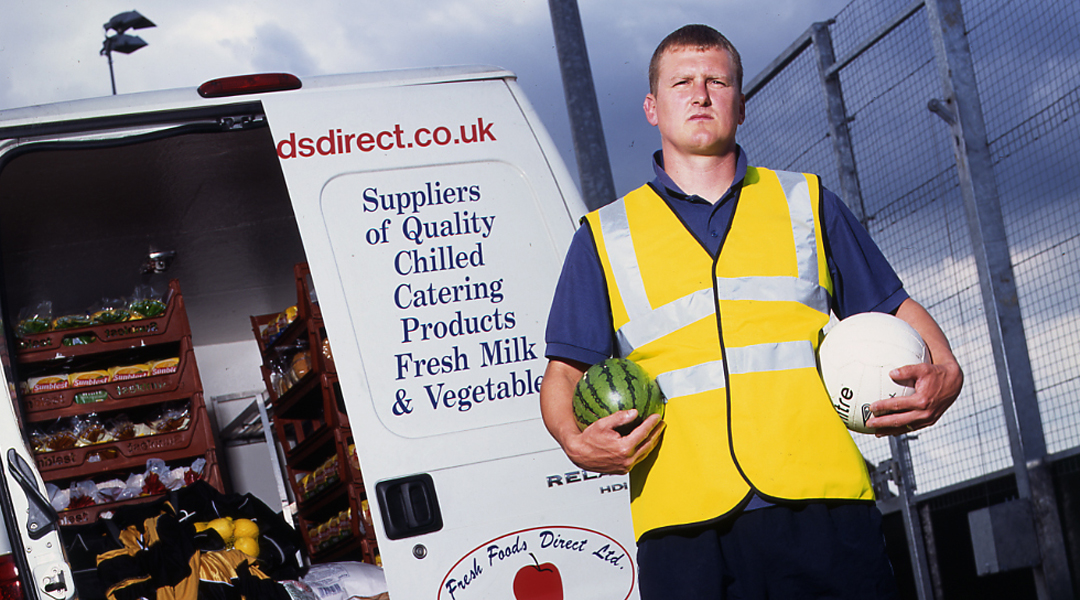
Marginson gets some change from a newsagent before walking into the Midland, nervous and hot. “Unlike the lads who set up FC United alongside me facing the cameras, I had no media experience,” he tells FourFourTwo. “They were used to answering difficult questions. Me? I said ‘basically’ five times in the first three sentences. Then I relaxed. I was the right man for the job so why shouldn’t I be confident?”
Marginson gave several interviews to the media, improving steadily with each. His appointment occupied column inches from the San Diego Times to the New Zealand Herald. Afterwards, he returned to his van, changed back into his work clothes and carried on with his delivery round as radio bulletins did indeed ask ‘Karl who?’ with a mixture of excitement, hostility and incredulity.
United's main man
Get FourFourTwo Newsletter
The best features, fun and footballing quizzes, straight to your inbox every week.
I said ‘basically’ five times in the first three sentences. Then I relaxed. I was the right man for the job so why shouldn’t I be confident?
Marginson grew up in Ancoats, “a rough, ready and honest” area adjacent to Manchester city centre. “You could leave your fags on a bar in the pub and no one would take them,” he remembers.
“Football kept us out of trouble. We’d play five-a-side four hours a night in a lads’ club run by the police. I supported United and Steve Coppell was my hero, Glenn Hoddle too. I went to United with my mates every week. Ancoats kids can’t do that now – United has been taken from Manchester’s working class.
“My son wouldn’t be able to go with his mates because it’s too expensive,” he adds. “They can’t go and stand or even sit together like I did. As a United fan, I find the Glazer takeover scary; about money, business, and profits. FC United is an alternative, it’s about football at three o’clock on a Saturday afternoon and standing with your mates at a price you can afford.”
Four thousand Manchester United supporters have pledged more than £100,000 to FC United of Manchester, the idea first mooted in February when (now-defunct) fanzine Red Issue proposed that if Malcolm Glazer’s attempted takeover of United was successful, fans should set up a new club run along the democratic lines of AFC Wimbledon. Initially considered radical, the idea gathered momentum when Irish businessmen JP McManus and John Magnier sold their shares to the American tycoon.
The (anonymous) author of the Red Issue article described his motives: “The main motivation for setting up the new club was knowing that so many of those who were leading the opposition to Glazer, and for so many years had formed the core of United’s ‘political’ fan movement, would no longer be able to go to Old Trafford if Glazer assumed control. Be that on a point of principle, or because of the cost, these people would be lost to United. This core group, and many others who’d be in the same position, had to be kept together because going to matches is an easy habit to fall out of once that initial bond is broken.
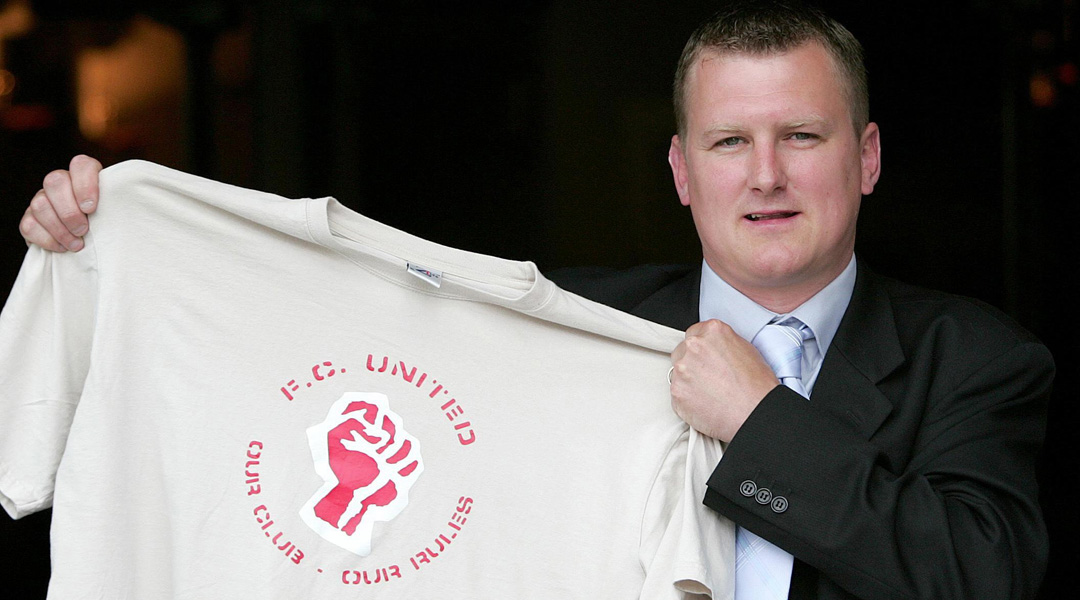
“The question was how? No one could just go and support another club, and it was unrealistic to assume people would turn up to protest outside Old Trafford every week – so it had to be something positive.
That meant setting up our own club, doing our own thing. Many fans don’t like the idea: ‘There’s only one United’ and ‘I couldn’t support another club’ are two typical responses.
But many of those fans are happy to watch United’s reserves, or United’s youth team, so this is just an extension of that – this is United’s supporters’ team.
This core group had to be kept together because going to matches is an easy habit to fall out of
“Provided there’s a buzz about the club and people can enjoy themselves at games, provided they can stand with their mates and have a good laugh, nothing else will really matter. They won’t feel ripped off, and they’ll appreciate the days out for what they are – an excuse for having a good time. Because, while Glazer has been the catalyst, the idea of FC United has probably been driven just as much by the support from people who have been left disaffected by the rampant commercialism of top-flight football.”
Glazed over
As well as dominating headlines, the Glazer takeover divided United’s fan base. Lazily derided for all being prawn sandwich eaters from Surrey, the United hardcore is highly regarded by peers at other clubs for the way in which they battled against the Murdoch takeover in 1998/99.
By the time the Irish duo of McManus and Magnier started buying up shares in 2001, Shareholders United and the Independent Manchester United Supporters Association (IMUSA) were respected bodies who had regular dialogue with the Old Trafford board.
Founded by the investigative journalist Michael Crick in 1998, SU counted serious professional heavyweights within its membership, while IMUSA dealt with issues like ticketing which affected the match-going fans. Both groups were well organised, their spokespeople media-savvy.
Yet while polls showed 98 per cent were against Glazer, reactions varied when the takeover was completed in May. The vast majority, while vehemently opposing the American, renewed their season tickets and will continue going to matches at Old Trafford. They argued that they would “wait and see” what the Glazer effect would be while continuing to support United.
Another oft-voiced opinion was that fans had never been enamoured with United’s previous proprietors, so why should life under Glazer be so different? Nevertheless, a large body of supporters indicated their desire to be involved in FC United, with some determined never to set foot inside Old Trafford as long as Glazer is in charge. Many others said they would support both clubs.
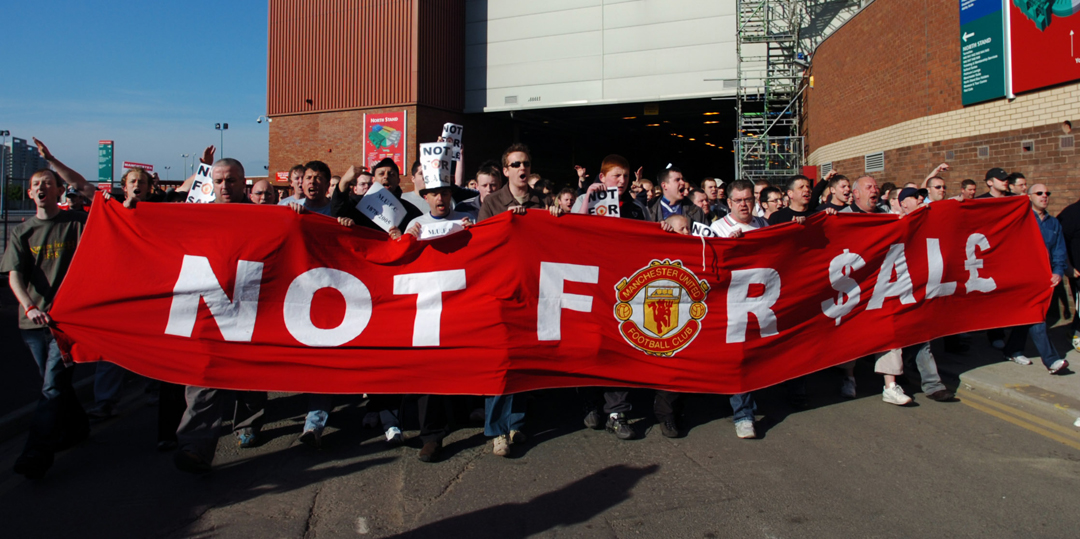
Two public meetings were held in Manchester for fans to discuss the takeover and the FC United idea: 700 impassioned supporters – most of them Old Trafford regulars – attended the first and 2,000 the second. Also there that night was ex-AFC Wimbledon chairman Kris Stewart.
“I’ve never been a fan of Man United,” says Stewart. “Yet the people I spoke to care about the sort of things we care about. Their circumstances were slightly different, but there was a real passion – I realised that when a man stood up and, unprompted, sang We’ll Never Die. I thought everybody would laugh, but they didn’t. Emotions were high.
“Like us, FC United had to form a club almost immediately and I advised them on the basics: they had to register and get senior status from the local county FA, they needed a place to play, a league to play in, a manager, players. Everything else – training facilities, money, turnstile operators – would follow.”
There was a real passion – I realised that when a man stood up and sang We’ll Never Die
Local MPs also attended and a steering committee of United fan activists was set up to form a new club, initially named FC United – although the FA later rejected that name for being “too ambiguous”. A website was set up and fans began pledging money – 2,600 did so within a week.
“A massive leap into the unknown”
The non-league community hummed with excitement, scepticism and envy, upsetting football’s summer ennui. Offers of friendlies arrived from Conference clubs, most eyeing a potential bumper crowd.
But the club had more pressing priorities and throughout June a group of 15 people worked tirelessly. Several clubs, from Altrincham to rugby union outfit Sale, were approached about a ground share.
All bar two rejected the advances. Dave Pace, an outspoken maverick and the Manchester United-supporting chairman/manager of Conference North side Droylsden, five miles east of Manchester city centre, put his money where his mouth is. He offered the use of Droylsden’s much-improved-but-tiny Butcher’s Arms, capacity just 3,500.
Talks continued with League Two’s Bury up to the eve of their first game, a mid-July friendly against Leigh RMI, and almost all of their league matches have been played there since.
Those supporters who had pledged money were invited to vote for a name for the club – settling on FC United of Manchester. An application was made to join the North West Counties League Second Division, the lowest in the non-league pyramid and 10 divisions below the Premier League.
The league were impressed with FCUM’s proposals (and doubtless the publicity) and accepted the club for the new season as negotiations continued with a local council worried that some 15,000 fans would descend on Droylsden.
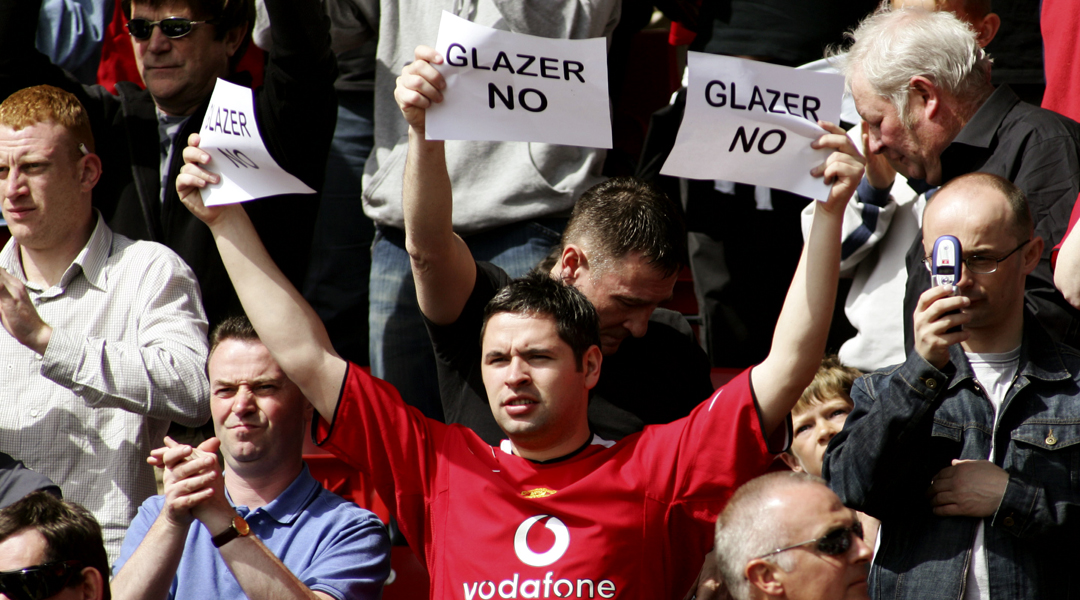
“We were taking a massive leap into the unknown,” says Andy Walsh, a member of the organising committee. “But this is not just a reaction to Malcolm Glazer; this is about taking a stand for the vast number of ordinary fans who have been priced out of the game in recent years.
“There are people who object to his involvement and will not go to Old Trafford purely because of that, but there are many others who cannot afford to go to games anymore or can’t re-arrange their lives at the drop of a hat because the TV schedules have changed again. Hopefully, what we are creating here will allow those people to get involved in the game again.”
This is not just a reaction to Malcolm Glazer; this is about taking a stand for the vast number of ordinary fans who have been priced out of the game
Walsh was one of the fans who decided not to renew his season ticket. “I’ll desperately miss going to Old Trafford but I won’t support Glazer’s business,” he vows.
Building from scratch
Having been accepted into a league, FCUM appointed Marginson as manager, partly because of his extensive contacts in the semi-professional game. He brought in an assistant, former Macclesfield player Phil Power. “He looks a bit like Carlos Queiroz, but he’s got a better tan,” laughs Marginson.
A public trial was held to find players; of the 930 people who applied to attend, 260 were invited. The applications ranged from the bizarre to the ridiculous. One player boasted that he played football in the garden whenever his brother held a BBQ. “He’s not saved one of my shots,” he claimed. Another stated that he played on the left, and the right, and up front too. “I’m six foot five,” he boasted, “and agile.”
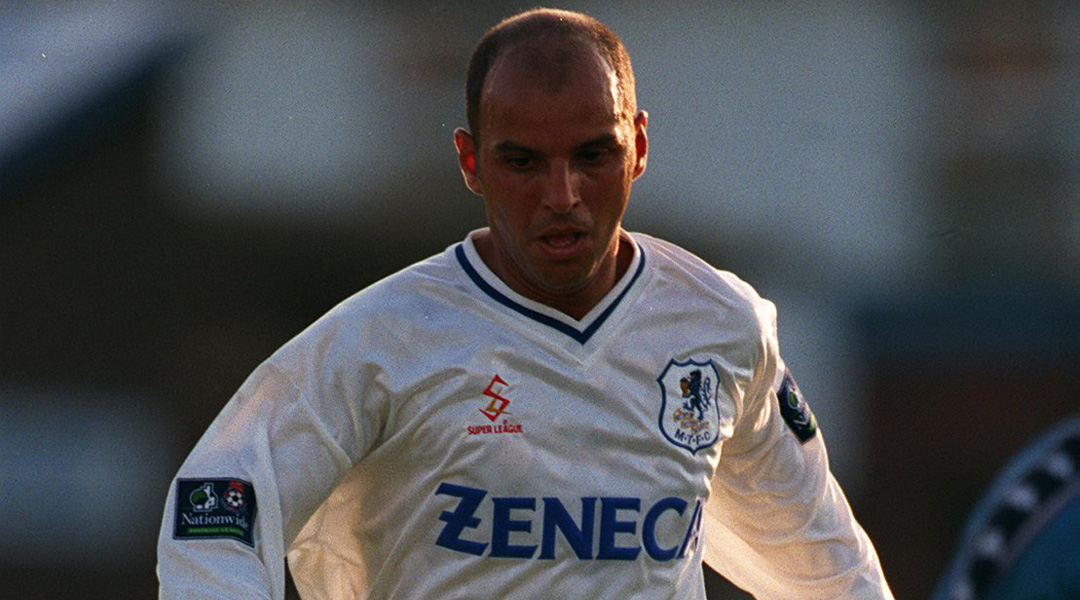
“Lads were saying that they would do anything to fight Malcolm Glazer and many had been on the front line in the protests,” says Marginson. If the enthusiasm was high, the standard was variable, but 17 potential players were invited for pre-season training.
“The most important thing was to get players who could get us out of the league,” says Marginson. “One lad did really well in the trial. I called him the next day; his mum answered and shouted ‘I think it might be them, it might be them!’ He was giddy with excitement and shouted ‘Yes!’ That was nice.
“I’ve also got in several experienced semi-pro players,” he adds. “They won’t want to take a pay cut after dropping down several divisions, but they were all excited when I spoke to them and the idea didn’t need much selling. Some may see it as a meal ticket but we’ll find them out straight away. We want honest lads and personalities because we have to build a team spirit very quickly.”
Marginson’s first signing was Jonathan Mitten, a former Altrincham forward who received offers to move to Conference North teams.
One player boasted that he played football in the garden whenever his brother held a BBQ
“I want to play for FC United because I’m a United fan,” he says. “Playing in front of big crowds which will include many of my mates appeals. There’ll be lads there who I used to go to Old Trafford with when I had a junior season ticket in the Stretford End which cost £38.
"It would cost over £1,000 to sit in the same section of the ground today because they put executive seats in where we used to stand.
"We walked to Old Trafford or went on the bus which was full of kids from Urmston and Stretford. That bus is empty these days. Kids don’t want to apply for tickets six weeks in advance of a game to sit alone.
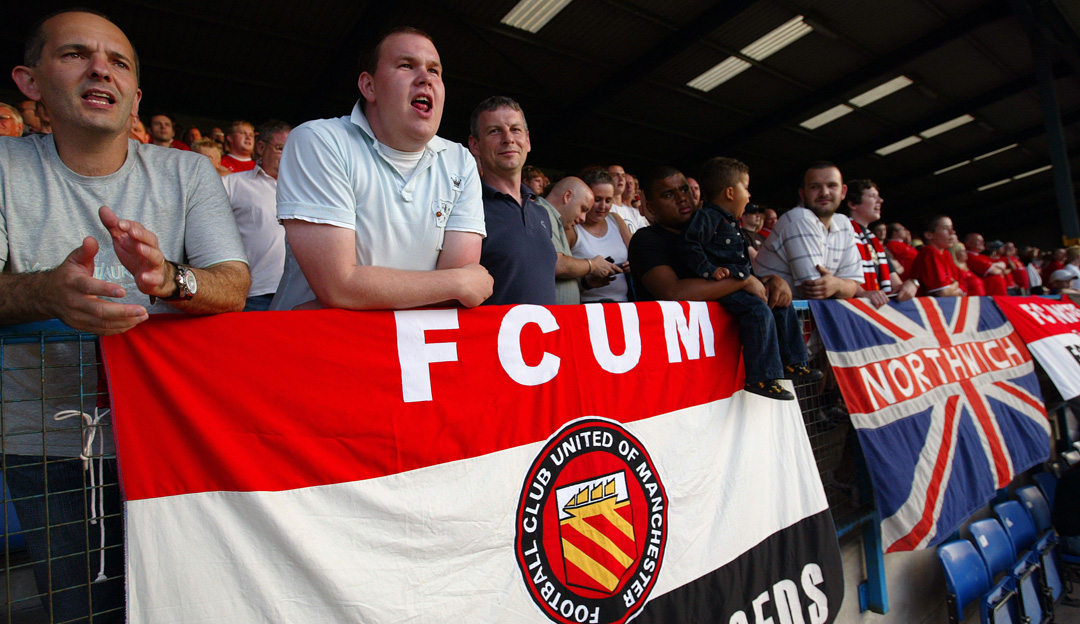
“I saw the crowd change at Old Trafford because I stood outside the ground selling fanzines for six years in the ’90s,” he adds. “And I could see the fans changing for the worse year after year.
"Tourists used to ask me if I was selling the programme, where the ‘Busby Best’ statue was or even where Old Trafford was. Like the fans, I’m taking a gamble with FC United and some players are sceptical that it will take off, but I’m confident of success.”
I’m taking a gamble with FC United and some players are sceptical that it will take off, but I’m confident of success
Nevertheless, as FCUM are rapidly discovering, it’s naive to view the Premier League as an evil capitalist domain and the non-league scene as a football utopia where players perform for the love of the game. One Stevenage Borough player earns £1,400 a week, plus a car and free accommodation.
“The money at FC United won’t be a tenth of that but all footballers go where the money is,” says Mitten. “An increase may not make much difference to Rio Ferdinand’s life but it makes a difference to lads in factory jobs. Their football money pays the rent.”
Haters gonna hate
But if the players are looking forward to a new beginning, the fans are still divided with civil war raging on internet message boards throughout the summer. “FC United, the haven for the terminally childish and immature,” wrote Stuart Webb of Southend, on the Manchester Evening News website.
“The number of extremists attending these games (all 300-500 of them) will necessitate a large police presence, hopefully with riot gear on hand, just in case these yobs don’t get their way. I pity the small clubs in the NWCL, having to put up with the ‘redder than red’ brigade invading their little grounds and towns next season. Still, at least the loyal, real United fans will be better off without them polluting the Old Trafford atmosphere, with their narrow-minded views of other United supporters.”
While there was some support from fans of other clubs, including Manchester City, many non-league fans posted sneering accusations of ‘big time charlies’ and ‘arrogance’. Yet the same fans wanted a friendly.
I pity the small clubs in the NWCL, having to put up with the ‘redder than red’ brigade invading their little grounds and towns next season
“Envy is inevitable,” says Mitten. “And we’ll get some abuse. That’s why we need players who are used to playing in front of crowds because people will love you and hate you. Any criticism is unfair because this is a club founded and run by supporters, but there’s pressure from the start.”
When AFC Wimbledon invited FC United for a game – the Supporters Direct Trust Cup on July 23 – tickets sold faster than any game in their short history. “FC United will face the same pressures that we had,” predicts Wimbledon chairman Stewart.
“They will get a lot of initial publicity and they will get people who like the idea of standing on the terraces but won’t be happy about getting wet. But more people will laugh about it and get on with it and our attendances have held up as we continue to build a sustainable club where the fans’ interests come first.”
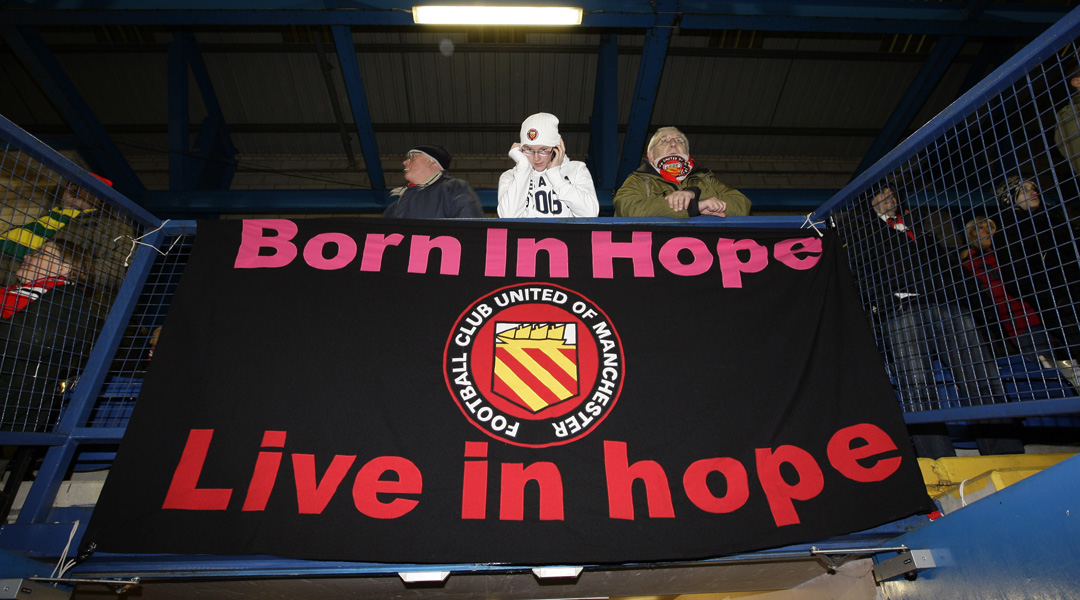
By July, the fans had voted for a club badge featuring the Manchester coat of arms while a committee of 12 was elected at a meeting attended by 700. The manager’s arrival at the meeting prompted a mass chant of “Marginson’s red and white army”. The buzz was tangible.
“I’ve not been as excited about anything for years,” said founder member David Mitchell. Fans also voted in favour of the club becoming an industrial and provident society: every member has one vote, the board is directly elected and any profit has to be ploughed back into the club.
Fans voted to accept a manifesto that declared the club had been founded by “disaffected and disenfranchised Manchester United supporters”. That manifesto adds: “Our aim is to create a sustainable club for the long-term which is owned and democratically run by its members, which is accessible to all the communities of Manchester and one in which they can participate fully. FC United of Manchester is intended to create a football club which addresses the concerns many United fans have had over the last decade or more as to how the club have developed, culminating in the takeover by Malcolm Glazer.”
Our aim is to create a sustainable club for the long-term which is owned and democratically run by its members
“If United fans carry this off there will be plenty of other clubs’ fans looking at it and thinking ‘we can do that too’,” says the writer of that seminal Red Issue piece. “FC United was a pipe dream. At the moment so is a non-league division of all the great names of English football, but one day such teams as AFC Liverpool, Real Chelsea and Newcastle Dynamos could become a reality if supporters continue to be taken for granted by the bodies running English football. It’s just a matter of the fans realising exactly where the real power lies.”
Ten years on, Marginson is still in charge, average attendances are above 2,000 and FC United have powered their way to four promotions. After the same number of unsuccessful play-off appearances in a row, Marginson's side will finally play in the Conference North next season after romping to the title. Two tiers from the Football League, it's no longer such a pipe dream.
A version of this feature originally appeared in the September 2005 issue of FourFourTwo. Subscribe!

Andy Mitten is Editor at Large of FourFourTwo, interviewing the likes of Lionel Messi, Eric Cantona, Sir Alex Ferguson and Diego Maradona for the magazine. He also founded and is editor of United We Stand, the Manchester United fanzine, and contributes to a number of publications, including GQ, the BBC and The Athletic.
